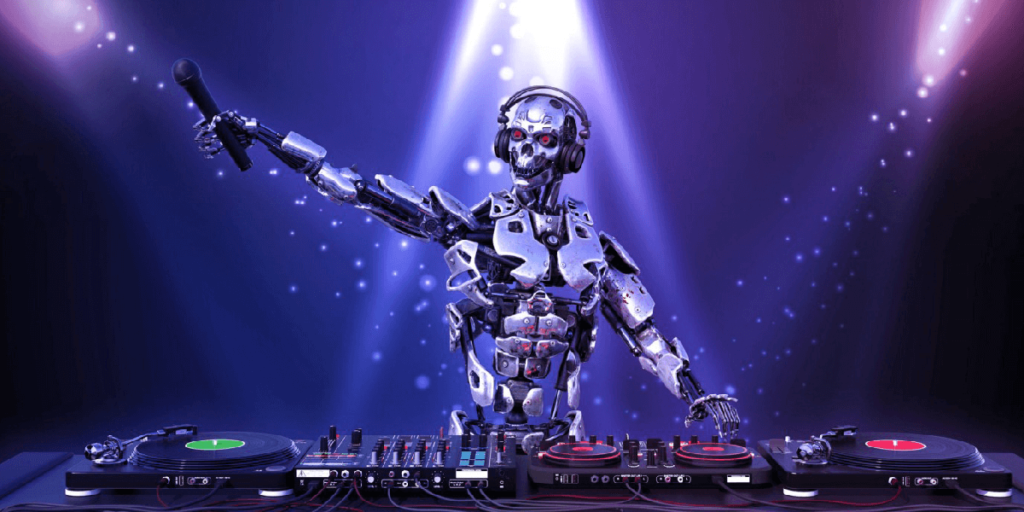In today’s rapidly evolving technological landscape, not only are our music consumption habits being transformed, but the very process of artificial music creation itself is undergoing a groundbreaking shift. The emergence of artificial intelligence (AI) programs is paving the way for the creation of tracks from scratch, bypassing the need for traditional songwriters, composers, and performers.
A slew of innovative startups, including Music LM, AI Music, Melodrive, Groov.AI, Humtap, and Popgun, are now offering AI software designed to assist in musical composition. But it doesn’t stop there—tech giant Meta has also thrown its hat into the ring. The company recently unveiled the first version of MusicGen, an open-source tool that harnesses the power of AI to generate music based on text descriptions.
Operating akin to generative AI tools like ChatGPT and Dall-E, MusicGen leverages language comprehension and learning models trained on vast amounts of data to craft instrumental pieces up to 12 seconds in length. Users simply provide a precise prompt, outlining their desired musical genre, tempo, instruments, or mood. In just a matter of minutes, the machine ingeniously constructs an original track tailored to their specifications.
The technical marvel of MusicGen can be attributed to the extensive training it has undergone, drawing from a staggering 20,000 hours of recordings. These recordings have been sourced from various platforms, including royalty-free music libraries such as Shutterstock and Pond5, as reported by the reputable tech news website, TechCrunch.
With AI at the helm of music creation, the boundaries of musical expression are being pushed in unprecedented ways. This remarkable fusion of technology and artistry opens up new possibilities, offering musicians and enthusiasts alike a novel avenue for inspiration and experimentation. As AI continues to evolve and shape the future of music, we find ourselves at the forefront of an extraordinary sonic revolution.
The rise of AI in music creation signals a paradigm shift in the industry. While some may view it as a threat to the artistic process, others embrace the newfound possibilities it presents. AI-powered tools like MusicGen provide a creative outlet for those who may not possess formal musical training but have a vision for their desired sound. This democratization of music production allows individuals from diverse backgrounds to express their ideas and contribute to the musical landscape.
Critics argue that AI-generated music lacks the soul and emotional depth that human musicians bring to their craft. However, proponents of AI in music creation emphasize that these technologies are not meant to replace human creativity but rather enhance it. By harnessing the immense capabilities of AI algorithms, musicians can access a vast array of musical styles, genres, and sounds, expanding their creative palette and pushing the boundaries of what is musically possible.
The implications of AI in music creation extend beyond individual artists. The technology opens up avenues for innovative collaborations between humans and machines. Musicians can now engage in a dialogue with AI systems, experimenting with different ideas and styles in a symbiotic relationship. The fusion of human expression and AI-generated compositions may lead to entirely new genres and sonic landscapes that were previously unimaginable.
However, as AI-generated music becomes more prevalent, questions of copyright and originality arise. Who owns the rights to AI-generated compositions? How do we ensure that AI systems do not infringe upon existing copyrighted works? These legal and ethical considerations will require careful examination as the music industry adapts to this transformative technology.
Ultimately, the integration of AI in artificial music creation is an exciting frontier that promises both challenges and opportunities. As technology continues to advance, musicians, listeners, and industry professionals must navigate this evolving landscape with an open mind. Whether AI becomes a tool for inspiration, collaboration, or even the birth of entirely new musical genres, the harmonious convergence of human ingenuity and artificial intelligence has the potential to revolutionize the way we create and experience music.





 Way To Become A Freelancer Under National Freelance Training Program
Way To Become A Freelancer Under National Freelance Training Program